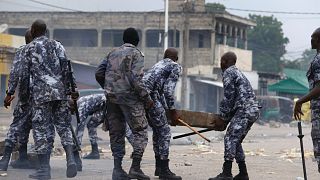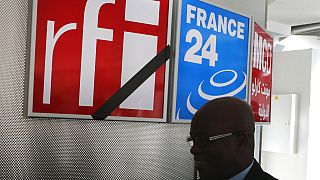Togo
Residents in Togo’s capital Lome, have welcome the move by the government to import cleaner fuel into the country.
Togo is one of five African nations that announced a ban on the importation of fuels with high levels of sulphur from European manufacturers that are exploiting the weak regulatory policies in the West African region.
The World Health Organization considers sulphur particles emitted by diesel engines as one of the major contributors to air pollution. Studies have shown that sulphur is responsible for a number of health conditions, including heart disease, lung cancer, and respiratory illnesses such, as asthma or bronchitis.
“We must forbid that. It is also risky and it is dangerous for the people,” said one Loom resident, Samuel Agblevon.
“This is a very good decision, because toxic fuel causes too much damage,” said another Lome resident Georges Gunn.
A statement released by the UN Environment Program (UNEP) last month welcomed the move saying it will help more than 250 million people in the affected countries breath safer and cleaner air.
The five countries have also agreed to upgrade the operations of their national refineries – public and privately owned – to improve the quality of their fuel by 2020, UNEP said.
In Togo, many have backed the decision, especially those who say their cars have been damaged by toxic fuel.
“We often have to change the engines which are damaged by the toxic fuel, which is the fuel that is used here. And all of this really affects our work. People often have to change their car engines because of the damage and when you change a new car’s engine with an old one, you have to put an engine that supports the fuel that is used from here. That’s the problem,” said Mathieu Adjinda, a mechanic.
Air pollution can be a problem in the heavy traffic, typical with some of Africa’s biggest metropolis.
In September last year, a BBC report criticized five Swiss firms for their involvement in the exportation and sale of “dirty” fuels in Africa, even though their sulphur levels were considered too toxic for European markets.
“With that decision, we will be more watchful and insist that the government respect this commitment, because it’s one thing to make that decision, it’s another to implement it. We must also establish checkpoints and a better monitoring system to control the quality of fuel that is imported and that comes through at the airport, as well as at the petrol stations and in the distribution of fuel,” said Secretary-General of the Togolese Consumers Association, Aladjou Agouta.
Outside of West Africa, Kenya, Tanzania, Uganda and Morocco have all increased fuel quality requirements in recent years.
But better quality drives up costs, and with many nations facing severe shortages in public finances, they are wary of angering people with higher pump prices, analysts say.





![Cyber Africa Forum highlights Benin's bold digital resilience [Business Africa]](https://static.euronews.com/articles/stories/09/33/14/38/320x180_cmsv2_675083a0-3d42-5b59-aba8-cbd15242e6d9-9331438.jpg)







01:30
Nigerian singer Tems launches Leading Vibe Initiative to support women in music
00:52
Nigeria’s Peter Obi to contest 2027 election, opposition coalition in jeopardy
00:29
At least 7 people killed during recent anti-government protests in Togo
11:15
AI drones lead breakthrough against malaria in Africa [Business Africa]
01:13
17 soldiers killed as gunmen raid army bases in northern Nigeria
00:58
Ghana's parliament approves $2.8 billion debt restructuring deal